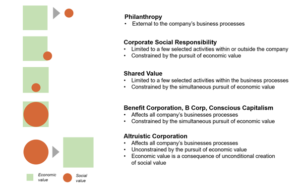
The Altruistic Corporation: Reinventing companies by serving the common good and thriving as a result
Isaac Getz and Laurent Marbacher
Working paper ESCP Business School
July 2020
Adam Smith posited that by pursuing its economic self-interest, business creates social value. The data backs him up: from 1820 to 2001, per capita income rose twentyfold in the industrialized West (only sixfold in the rest of the world).[ii] This has meant that for the first time in human history, a significant portion of humankind could escape from living at mere subsistence level. Unfortunately—and increasingly—these benefits also come with collateral damage to our societies. There have been attempts to mitigate this damage for as long as modern business has existed,[iii] culminating in today’s approaches ranging from Corporate Social Responsibility (CSR) to the Triple Bottom Line (TBL) and Conscious Capitalism, all trying to generate both economic and social value simultaneously. But as John Elkington, the inventor of TBL, wrote recently: “Whereas CEOs… move heaven and earth to ensure that they hit their profit targets, the same is very rarely true of their people and planet targets. Clearly, the Triple Bottom Line has failed to bury the single bottom line paradigm.”[iv] The latest of these attempts, the Business Roundtable “Statement on the Purpose of a Corporation”[v] in which 181 of the top CEOs in the US committed to satisfy all their stakeholders, still does not show how this can be achieved simultaneously.
And what if the solution to social value generation by businesses lay in not pursuing profits at all? What if, as a result—and in a complete reversal of the sequence according to Adam Smith—such businesses outperformed their competitors economically? And what if it was a bank—among all the possible businesses—that was actually to put this into practice?
To continue reading



